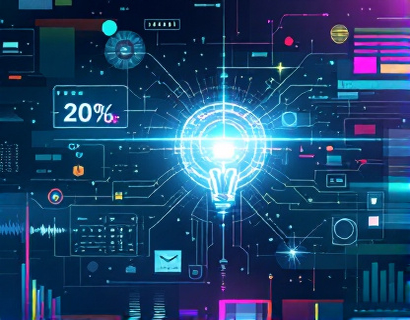Revolutionizing Digital Transformation: The Synergy of Crypto and AI
The intersection of cryptocurrency and artificial intelligence (AI) is catalyzing a new era of digital transformation, redefining user engagement and driving unprecedented innovation. This synergy is not just about merging two cutting-edge technologies but about creating advanced ecosystem solutions that enhance connectivity, foster growth, and elevate user satisfaction. As we delve into this topic, it's essential to understand the foundational roles that both crypto and AI play in this revolution.
Understanding Cryptocurrency and Its Role in Digital Ecosystems
Cryptocurrency, often seen as digital or virtual currency, operates on blockchain technology, a decentralized ledger that ensures transparency, security, and immutability. Beyond being a medium of exchange, cryptocurrencies serve as a foundational element in building trustless and decentralized ecosystems. These ecosystems are crucial for fostering innovation, as they allow developers and businesses to create applications and services without the need for intermediaries, thereby reducing costs and increasing efficiency.
The decentralized nature of cryptocurrencies enables seamless peer-to-peer transactions, which is particularly beneficial in digital ecosystems where multiple parties interact. Smart contracts, self-executing contracts with the terms directly written into code, further enhance this by automating and enforcing agreements without the need for central authority. This automation not only speeds up processes but also minimizes the risk of human error and fraud.
AI: The Brain Behind the Digital Transformation
Artificial intelligence, on the other hand, brings intelligence, adaptability, and learning capabilities to digital ecosystems. AI technologies, including machine learning, natural language processing, and computer vision, enable systems to analyze vast amounts of data, identify patterns, and make informed decisions. In the context of digital transformation, AI acts as the brain, providing insights and driving automation, personalization, and predictive analytics.
One of the most significant impacts of AI is in enhancing user engagement. By leveraging AI-driven analytics, businesses can gain deep insights into user behavior, preferences, and needs. This data-driven approach allows for the creation of highly personalized experiences, from tailored content recommendations to customized product suggestions. Such personalization not only improves user satisfaction but also increases engagement and loyalty.
Connectivity: Bridging the Gap with Crypto and AI
The integration of crypto and AI significantly enhances connectivity within digital ecosystems. Blockchain technology ensures secure and transparent data exchange, while AI facilitates the analysis and management of this data. This combination creates a robust framework for building interconnected systems where data flows seamlessly and securely between different components and stakeholders.
For instance, in supply chain management, blockchain can track the movement of goods in real-time, ensuring transparency and traceability. AI algorithms can analyze this data to predict demand, optimize inventory, and identify potential bottlenecks. This synergy not only streamlines operations but also builds trust among all parties involved, from manufacturers to consumers.
Growth and Scalability: Advantages of Crypto and AI Synergy
The synergy between crypto and AI fosters growth and scalability in digital ecosystems. Decentralized platforms powered by blockchain can scale more efficiently as they eliminate the need for central servers and intermediaries. This scalability is further enhanced by AI, which can dynamically adjust resources and processes based on real-time data, ensuring optimal performance even as the ecosystem grows.
Moreover, the tokenized economy enabled by cryptocurrencies provides a new model for incentivizing participation and contribution. In many decentralized applications, tokens serve as utility tokens that reward users for contributing value, such as data, computing power, or content creation. This token-based incentive structure aligns the interests of all participants, fostering a collaborative and growth-oriented environment.
Enhanced User Satisfaction through Advanced Solutions
One of the most tangible benefits of the crypto and AI synergy is the enhancement of user satisfaction. By combining the security and transparency of blockchain with the intelligence and adaptability of AI, digital ecosystems can offer unparalleled user experiences. For example, in the realm of finance, decentralized finance (DeFi) platforms leverage AI to provide sophisticated trading algorithms, risk management tools, and personalized financial advice, all while maintaining the security and transparency of blockchain.
In the healthcare sector, AI-driven diagnostic tools can analyze medical data stored on a blockchain, providing accurate and secure health records. This integration not only improves the accuracy of diagnoses but also ensures patient data privacy and security. Similarly, in the education sector, AI-powered adaptive learning platforms can tailor educational content to individual student needs, while blockchain ensures the integrity and ownership of educational credentials.
Case Studies: Real-World Applications
To better understand the practical applications of crypto and AI in digital transformation, let's explore a few real-world examples.
One notable example is the use of blockchain and AI in the gaming industry. Decentralized gaming platforms like Axie Infinity combine blockchain for asset ownership and smart contracts with AI for dynamic game environments and NFT-based characters. This synergy not only ensures fair and transparent gameplay but also creates new revenue streams for players through tokenized rewards.
Another example is the application of AI in supply chain finance. Companies like Provenance use blockchain to track the origin and journey of products, ensuring authenticity and ethical sourcing. AI algorithms analyze this data to optimize logistics, predict demand, and manage inventory, leading to more efficient and sustainable supply chains.
Challenges and Considerations
While the potential of crypto and AI in digital transformation is immense, there are several challenges and considerations that need to be addressed. Regulatory uncertainty remains a significant hurdle, as governments worldwide are still grappling with how to regulate these emerging technologies. Ensuring compliance while maintaining the decentralized and innovative nature of these ecosystems is a delicate balance.
Another challenge is the technical complexity involved in integrating blockchain and AI systems. Developers need a deep understanding of both technologies to create seamless and secure solutions. Additionally, there is a need for standardization to ensure interoperability between different platforms and systems.
Future Outlook: The Path Forward
Looking ahead, the future of crypto and AI in digital transformation is bright, with numerous opportunities for innovation and growth. As technology continues to evolve, we can expect more sophisticated and integrated solutions that further enhance user engagement and satisfaction.
One area of focus will be the development of more user-friendly interfaces and tools that demystify these complex technologies for the general public. Education and awareness campaigns will play a crucial role in driving adoption and fostering a broader understanding of the benefits and potential of crypto and AI.
Furthermore, the exploration of new use cases and industries will continue to expand the scope of these technologies. From smart cities to renewable energy, the applications are vast and varied, promising to revolutionize multiple sectors.
In conclusion, the synergy between cryptocurrency and artificial intelligence is not just a technological trend but a transformative force reshaping the digital landscape. By enhancing connectivity, driving growth, and elevating user satisfaction, this combination is paving the way for a more innovative, secure, and user-centric future.










































